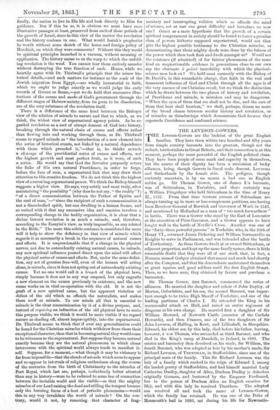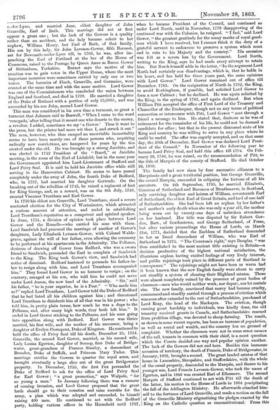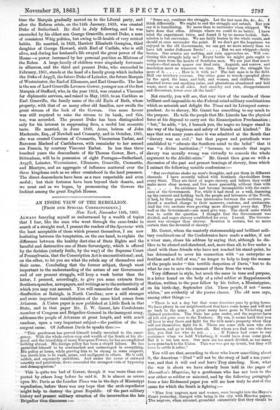THE LEVESON-GOWERS.
THE Leveson-Gowers are the luckiest of the great English families. They have risen within two hundred and fifty years from simple country baronets into the greatest, though not the
richest, territorialists in Great Britain, and their connection is, at this moment, perhaps the most powerful of the English political clans. They have been people of some mark and capacity in themselves, but the source of their dignity has been a succession of lucky alliances, being, though (lowers in lineal male descent, Levesons and Sutherlands by the female side. The pedigree, though curiously uncertain, is by no means a bad one as English nobles go. Sir Thomas Gower, one of James I.'s baronets, was of Stittenham, in Yorkshire, and there certainly was a William Fitzguhyer who held Stittenham in the time of Henry H., 1167. From that time Gowera owners of Stittenham are always turning up in more or less conspicuous positions, one having been Receiver-General of Berwick and Governor of Wark in 1543, and mentioned by liolinshed as a man of "too much forwardness" in battle. There was a Gower who stood by the Earl of Lancaster at the execution of Piers Gaveston, and a Gower appears to have fought well in the battle of Neville's Cross. Another was one of the "forty-three powerful persons" in Yorkshire who, in the 25th of Henry VI., returned James Pickering and William Normanville as Knights to serve in Parliament, and was beheaded after the battle of Tewkesbury. As these Gowers dwelt at or owned Stittenham, or adjacent properties, and kept up the same family names, there is little reasonable doubt that they were all of one stock, that, in fact, a Norman named Guhyer obtained that manor and much land shortly after the Conquest, and that his descendants maintained themselves as great squires and good soldiers until the first English Stuart. Then, as we have seen, they obtained by favour and purchase a baronetcy.
Sir Thomas Gower, first Baronet, commenced the series of alliances. He married the daughter and coheir of John Doyley, of Merton, Oxfordshire, and his son, the second Baronet, was impor- tant enough to be twice High Sheriff of Yorkshire, and one of the leading partizans of Charles I. He attended the King in his unsuccessful attack on Hull, and raised an entire regiment of dragoons at his own charge. He married first a daughter of Sir William Howard, of Naworth Castle (ancestor of the Carlisle Howards), and then Frances, one of the two daughters of Sir John Leveson, of Hailing, in Kent, and Lillieshall, in Shropshire. Edward, his eldest son by this lady, died before his father, leaving, however, a son Thomas, who succeeded as third Baronet, and who died in the King's camp at Dundalk, in Ireland, in 1689. The estates and baronetcy then devolved on his uncle, Sir William, the fourth Baronet, who was adopted as heir by his mother's uncle, Sir Richard Leveson, of TRENTHAM, in Staffordshire, since one of the principal seats of the family. This Sir Richard Leveson was the heir of a family which ranked in the reign of Edward I. among the landed gentry of Staffordshire, and had himself married Lady Catherine Dudley, daughter of Alice, Duchess Dudley (a dukedom originally German, and bestowed by the Emperor Ferdinand, but in the person of Duchess Alice an English creation for life), and with this lady he received Trentham. The adopted son received all and took the name of Leveson-Gower, which the family has retained. He was one of the Duke of Monmouth's bail in 1683, sat during his life for Newcastle-
uader-Lyne, and married Jane, eldest daughter of John Granville, Earl of Bath. This marriage did not at first appear a great one ; but the luck of the (lowers is a quality rather than an accident, and the lady became coheir to her nephew, William Henry, last Earl of Bath, of that family. His son by this lady, Sir John Leveson-Gower, fifth Baronet, sat for Newcastle-under-Lyne till, in 1703, he was, after im- peaching the Earl of Portland at the bar of the House of Commons, raised to the Peerage by Queen Anne as Baron Gower of Stittenham, Yorkshire. Burnet says the motive of the creation was to gain votes in the Upper House, where the most important measures were sometimes carried by only one or two voices. The baronies of Finch, Granville, and Germaine, were created at the same time and with the same motive. Lord Gower was one of the Commissioners who concluded the union between England and Scotland, and died in 1709. He married a daughter of the Duke of Rutland with a portion of only 15,000/., and was succeeded by his son John, second Lord Gower.
This man was considered in his own time a turncoat, so great a turncoat that Johnson said to Boswell, "When I came to the word renegado,' after telling that it meant one who deserts to the enemy, a revolter, I added, sometimes we say a Gower.' Thus it went to the press, but the printer had more wit than I, and struck it out." The man, however, who thus escaped an unenviable immortality seems to have been merely one of those persons who, acquiring radically new convictions, are hampered for years by the ties created under the old. He was brought up a strong Jacobite, and was elected in 1742 President of the "Board," or Jacobite meeting, in the room of the Earl of Lichfield; but in the same year the Government appointed him Lord-Lieutenant of Stafford and Lord Privy Seal. It is said he held his Jacobite office while still serving in the Hanoverian Cabinet. He seems to have passed completely under the sway of John, the fourth Duke of Bedford, who, in 1737, had married his daughter Gertrude. On the breaking out of the rebellion of 1745, he raised a regiment of foot for King George, and, as a reward, was on the 8th July, 1746, created Viscount Trentham and Earl Gower.
In 1750 his eldest son Granville, Lord Trentham, stood a severe contested election for the City of Westminster, which attracted a curious amount of attention, and ended in establishing Lord Trentham's reputation as a competent and spirited speaker. In June, 1751, a division of opinion took place between Lord Gower and the Russells—who carried his sons with them. Lord Sandwich had procured the marriage of another of Gower's daughters, Lady Elizabeth Leveson-Gower, with Colonel Weide- grave, against the will of her father, even allowing the ceremony to be performed at his apartments in the Admiralty. The Pelhams, desirous of drawing off Gower from Bedford, who was a sworn friend to Sandwich, persuaded the Earl to complain of Sandwich to the King. The King took Gower's view, and Sandwich had notice of dismissal. Bedford hastened to persuade his father-in- law to resign along with him, and Lord Trentham accompanied him." They found Lord Gower in no humour to resign ; on the contrary, enraged at his son, who told him he could not serve under Lord Anson, the new head of the Admiralty. "Sir," said his father, "he is your superior, he is a Peer." "Who made him so ?" replied Lord Trentham. Lord Gower told the Duke of Bedford that he had listed all his children against him ; and threatened Lord Trentham to disinherit him of all that was in his power ; who told him, in pretty plain terms, how much he was a dupe to the Pelhams, and, after many high words, they both left him." It ended in Lord Gower sticking to the Pelhams, and his sons going into opposition along with Bedford. Earl Gower was thrice married, his first wife, and the mother of his successor, being a daughter of Evelyn Pierrepont, Duke of Kingston. He continued to hold the office of Privy Seal till his death, December 25, 1751. Granville, the second Earl Gower, married, as his second wife, Lady Louisa Egerton, daughter of Scroop, first Duke of Bridge- water, great-grandson of Frances Stanley, a descendant of Brandon, Duke of Suffolk, and Princess Mary Tudor. This marriage entitles the Cowers to quarter the royal arms, and brought eventually a large slice out of the great Bridgewater property. In December, 1755, the first Fox persuaded the Duke of Bedford to ask for the office of Lord Privy Seal for Earl Gower ; "a great promotion," says Walpole, "for so young a man." In January following there was a rumour of coming invasion, and Lord Gower proposed that the great lords should go to their counties and raise recruits for the army, a plan which was adopted and succeeded, he himself raising 400 men. He continued to act with the Bedford party, holding various offices in the Household until 1767, when h3 became President of the Council, and continued so under Lord North, until in November, 1779 disapproving of the continued war with the Colonies, he resigned. "I feel," said Lord Gower, "the greatest gratitude for the many marks of royal good- ness which I have received, but I cannot think it the duty of a grateful servant to endeavour to preserve a system which must end in ruin to his Majesty and the country." His secession was felt as a severe loss by the Government. Lord North, writing to the King, says he had made every attempt to retain him. But North himself adds in the letter, "In the argument Lord North had certainly one disadvantage, which is, that he holds in his heart, and has held for three years past, the same opinions with Lord Gower." Lord Gower remained out of office till December, 1783. On the resignation of North in 1782, the King, to avoid Rockingham, if possible, had solicited Lord Gower to form a new Cabinet ; but he declined. He was again solicited by the King, in the spring of 1783, and again declined. But when William Pitt accepted the office of First Lord of the Treasury and Chancellor of the Exchequer, though not on any terms of political connection or intercourse with Pitt, Lord Gower "sent through a friend a message to him. He stated that, desirous as he was of retirement for the remainder of his life, he could not be deemed a candidate for office ; but that in the present distressed state of his King and country he was willing to serve in any place where he could be useful. The offer was eagerly accepted, and on that same day, the 20th of December, Earl Gower was declared Lord Presi- dent of the Council." In November of the following year he became Lord Privy Seal, and held this office till 1794. On Feb- ruary 28, 1786, he was raised, on th3 recommendation of Pitt, to the title of Marquis of the county of Stafford. He died October 26, 1803. time the Marquis gradually moved on to the Liberal party, and after the Reform crisis, on the 14th January, 1833, was created Duke of Sutherland. He died in July following, and he was succeeded by his eldest son George Granville, second Duke, a man of consistent Whig politics, but owing to ill-he,alth of very retired habits. He married, in 1823, Harriett Elizabeth Georgina, third daughter of George Howard, sixth Earl of Carlige, who is still alive, and during her husband's life swayed the great power of the House—a power increased by her personal position as Mistress of the Robes. A large family of children were singularly fortunate in alliances, and the third and present Duke, who succeeded in February, 1861, stands at the head of a family group which includes the Duke of Argyll, the future Duke of Leinster, the future Marquis of Westminster, the Earl of Ellesmere, and Earl Granville. The last is the son of Lord Granville Leveson-Gower, younger son of the first Marquis of Stafford, who, in the year 1815, was created a Viscount for diplomatic services, and raised in May, 1833, to an Earldom as Earl Granville, the family name of the old Earls of Bath, whose property, with that of so many other old families, now swells the great stream of the luck of the Gowers. One more favour was still required to raise the stream to its bank, and this, too, was accorded. The present Duke has been distinguished only for his interest in suppressing fires, a useful but eccentric taste. He married, in June 1849, Anne, heiress of John Mackenzie, Esq., of Newhall and Cromarty, and in October, 1861, she was created Countess of Cromartie, Viscountess Tarbat, and Baroness Macleod of Castlehaven, with remainder to her second son Francis, by courtesy Viscount Tarbat. In less than three hundred years the descendants of Sir Thomas Gower, Bart., of Stittenham, will be in possession of eight Peerages—Sutherland, Argyll, Leinster, Westminster, Ellesmere, Granville, Cromartie, and Blantyre, and an aggregate of influence scattered over the three kingdoms such as no other cousinhood in the land possesses. The direct descendants have been as a race respectable and even useful ; but their fortunes have been beyond their deserts, and we must end as we began, by pronouncing the Gowers the luckiest among the great English Houses.
































 Previous page
Previous page